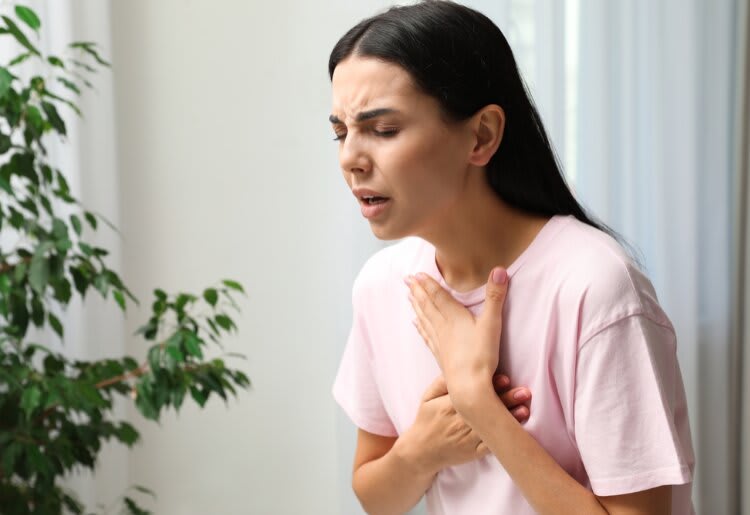As a clinical psychologist with over two decades of experience, I've helped many patients deal with breathlessness—a symptom that we occasionally trace back to underlying mental health conditions.
In this post, I'll help you determine if your shortness of breath is due to anxiety. We'll explore triggers that may set it off and look at coping techniques to offer relief. I'll also explain how online therapy can be invaluable in dealing with stress and pressure.
» Feel like yourself again with these online therapy services for anxiety.
How Is Shortness of Breath Related to Anxiety?
If you're experiencing breathlessness, it may be a symptom of an anxiety disorder. But see a doctor first to confirm, as various medical conditions can cause this.
Shortness of breath, medically known as dyspnea, can manifest as a tight chest or difficulty breathing. In the context of anxiety, this often stems from hyperventilation, where the balance of oxygen and carbon dioxide in your body is disrupted. This can lead to dizziness, tingling, and headaches.
"I think of anxiety as a false alarm of the sympathetic nervous system (SNS)—it's a fight or flight response to something that is perceived as alarming when it doesn't need to be," says Dr. Ellen Flannery-Schroeder.
When this happens, your body focuses on survival. Less critical functions, like digesting food, get paused. Your breathing speeds up to send more oxygen to your muscles, preparing you to deal with the supposed threat.
Shortness of Breath and Panic Disorders
Specific phobias, panic disorders, and panic attacks are known to include shortness of breath as a symptom. In the US and Europe, 2-3% of people have panic disorders, and about 9-11% experience panic attacks. Additionally, anxiety disorders are twice as common in females compared to males.
However, not everyone with panic or phobias will experience shortness of breath, as it's just one of several possible symptoms.
» Learn how to manage panic attacks.
What Triggers Anxiety-Induced Shortness of Breath?
Shortness of breath in anxiety can be triggered by past stress, ongoing challenges, or traumatic experiences, often seen in post-traumatic stress disorder (PTSD).
For those with social anxiety disorder, panic attacks typically relate to social situations and aren't random. Substances like alcohol, caffeine, and certain medications can also influence anxiety and shortness of breath.
Other contributing factors include:
- Your family's health history (genetics)
- Significant life stressors at home or at work
- Your temperament or the way you naturally act and feel
- Physiological, neurological, or physical changes, such as hormonal shifts
If you're unsure about your triggers, consider keeping a small notebook. Jot down the events or thoughts that preceded your episodes of breathlessness. This can help you identify patterns and potential catalysts more effectively.
Alternatively, you can seek counselling from online therapy networks like Calmerry or Thriveworks. With professional guidance, you can explore the underlying causes of your anxiety and gain insights into how your body responds to stress.
» Try these 10 powerful stress-management techniques.

Understanding the Mind-Body Connection in Anxiety
Your body's fight, flight, or freeze response automatically activates in dangerous situations. For example, when a snake is about to strike, your heart rate and breathing quickens, preparing you for a life-or-death reaction. Things that remind you of past dangers can trigger this response, too.
Classical conditioning plays a role here. If you were wearing white mittens during the snake attack, your brain might start associating those mittens with danger. Later, seeing anything similar, like a fluffy white animal, could also cause a fear response.
It can extend to everyday situations. For instance, if you view your job as essential for survival, negative feedback from your boss could trigger a self-preservation reaction. This includes faster breathing and an increase in heart rate.
Understanding this mind-body connection is crucial in managing anxiety. Online counselors from platforms like Online-Therapy.com can assist you as you examine these links. They can help you understand your body's responses to stress and work with you to develop coping strategies.
7 Techniques and Exercises to Manage Breathlessness
Here are techniques and exercises to help you cope with shortness of breath:
Breathing Techniques
When you begin to feel anxious, engage in deep breathing exercises. Regular practice, such as three times daily for two-minute sessions, can be beneficial for your health.
This routine not only helps in managing shortness of breath but also contributes to lowering blood pressure.
To establish a comfortable breathing rhythm, time your inhales and exhales; a recommended pattern is inhaling for four seconds and exhaling for six seconds.
Other breathing methods include:
- The 4-7-8 breathing technique: Inhale for four seconds, hold for seven, and exhale for eight. Repeat this four times—no more, no less.
- Box breathing: Visualize a square and count to four for each side. Breathe in for four, hold for four, exhale for four, and hold for four again.
- Exhaling through pursed lips: A quick, forceful exhale can slow your heart rate and calm your thoughts.
Mindfulness and Meditation
Try to stay fully present in your current surroundings. Notice the chair you're sitting on, how your body feels touching solid ground, and the textures around you. Take note of details like the color of the floor, the quality of lighting in the room, and the sounds around you.
Additionally, you can explore meditation apps, which offer guided mindfulness exercises and can boost your mental health.
Kendra Cherry, MSEd, says that mindfulness can potentially:
- Lower stress
- Decrease depression
- Improve memory
- Strengthen your relationships

Positive Self-Talk
If you experience shortness of breath, engage in positive self-talk. Tell yourself, "I understand what's happening. It may be uncomfortable, but I can handle it." Also, trust your doctor's reassurance that your heart and lungs are healthy.
Additionally, boost your confidence with affirmations like, "I am strong, capable, and can manage this. I can take deeper breaths next time."
Music and Sound
You can enhance your relaxation techniques with music or soothing sounds. I mainly like to listen to a recording of light rain. Consistency is key here—use the same song or sound loop regularly so your body can start associating it with relaxation.
Over time, it can become a shortcut to reaching a calm state. So, when you feel anxious or start experiencing shortness of breath, playing a familiar sound can help break the stress cycle.
Exercise and Yoga
Exercise offers numerous health benefits; just twenty minutes of cardio can relieve anxiety. Yoga, on the other hand, combines exercise, mindful breathing, strength-building, and positive affirmations.
While it may not be your first choice if you prefer high-intensity workouts, I highly recommend it for anxious individuals. There are many yoga apps available to help you get started.
Shock Techniques
Therapists may suggest briefly dipping your face in ice water to interrupt negative thought patterns. Another method is lightly snapping a rubber band on your wrist to shock yourself out of distressing thinking. However, the goal is to create a sensory surprise, not to cause pain.
Online Therapy
While self-diagnosis is common, it's better to get a professional diagnosis for appropriate treatment. Online therapy services like BetterHelp and Talkspace can help in various ways.
Therapists can use techniques like cognitive behavioral therapy (CBT) to help you address irrational thoughts and develop healthier ways of thinking. They can also assess if medicine might be beneficial and guide you to the best providers that can prescribe medication, such as Cerebral or Brightside.

Take Control of Your Breath and Anxiety
Recognizing the connection between anxiety and shortness of breath is the first step toward managing it effectively. By identifying triggers, practicing calming techniques, and seeking professional guidance when needed, you can regain control over your breath and your life.
Remember, there are various ways to keep mentally fit and conquer anxiety, so don't hesitate to explore what works best for you. Your journey to a calmer, breath-filled life starts now.
» Don't know where to begin? Here's how to find the right therapist.

